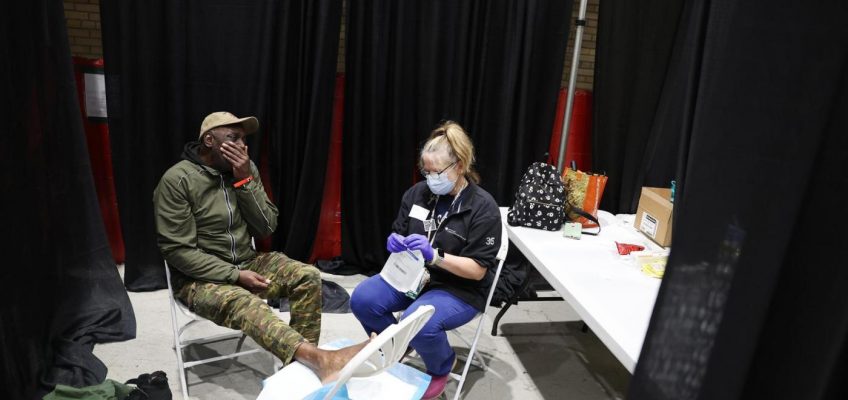By KAT LIEU, Voracious
At first glance, these Lychee-Frosted Sugar Cookies from my cookbook “108 Asian Cookies: Not-Too-Sweet Treats from a Third-Culture Kitchen” appear humble when unfrosted, like any other ordinary sugar cookie, like those you would find at the supermarket.
But don’t be fooled.
This cover image released by Voracious shows “108 Asian Cookies: Not-Too-Sweet Treats from a Third-Culture Kitchen” by Kat Lieu. (Voracious via AP)
These charming sugar cookies shine even on their own with their rich buttery base, tender crumb, bright refreshing citrus notes and a slight chew. Then, when topped with a luxurious buttercream infused with lychee extract, a bit of berry compote or jam, and finally crowned with chopped canned lychees, they undergo a bibbidi-bobbidi-boo moment. The more you bite into this layered and regal cookie, the more you’ll feel like royalty.
When pressing the dough portions, slightly wet the bottom of a glass or measuring cup, then dip into a shallow bowl of sugar to coat the bottom. For a variation you can skip the jam and add the lychees directly to the frosting. Store the cookies in an airtight container at room temperature, each separated by parchment paper, for up to 3 days.
This image released by Voracious shows a recipe for lychee-frosted cookies. (Voracious via AP)
Lychee-Frosted Sugar Cookies
Makes 9 large cookies
Ingredients
FOR THE COOKIES:
2 1/2 cups (300 g) all-purpose flour
2/3 cup (85 g) cake flour
1/4 teaspoon baking soda
1/4 teaspoon cream of tartar
1/2 cup ‘ 1 stick (113 g) unsalted butter, softened
6 tablespoons (90 g) neutral oil
1/2 cup plus 2 tablespoons (120 g) granulated sugar, plus more for pressing the cookies
About 1/2 cup (60 g) confectioners’ sugar
1 teaspoon red miso
1 large egg
1 tablespoon freshly grated lemon zest
1 teaspoon lychee extract
FOR THE FROSTING:
6 tablespoons (85 g) unsalted butter, softened
1 cup plus 2 tablespoons (140 g) confectioners’ sugar, divided
4 teaspoons (20 g) heavy cream
1 teaspoon lychee extract
Pink or red food coloring gel (optional, but if you use it, we want light pink, not a hot magenta pink)
FOR DECORATING THE COOKIES (OPTIONAL):
About 1/3 cup (110 g) store-bought strawberry jam
5 to 6 fresh or canned lychees, chopped
Edible pearl sprinkles or gold foil
Directions
1. Make the cookies. Whisk both flours, the baking soda and cream of tartar together in a medium bowl. Using a stand mixer fitted with the paddle attachment (or in a large bowl with a hand mixer, whisk, or spatula), cream the butter, oil, both sugars and miso together until light and fluffy. Scrape down the sides and bottom of the bowl. Add the egg, lemon zest, and lychee extract and mix until well incorporated. Again, scrape the bowl as needed. Add the flour mixture and mix on low speed just until a dough forms. Cover and chill the dough in the refrigerator for 30 minutes, or up to overnight.
2. About 25 minutes before baking, adjust a rack to the middle position and preheat the oven to 350°F. Line two baking sheets with parchment paper.
3. Use a large cookie scoop to create nine portions of dough, each about 3.2 ounces (1/2 cup, 90 g), placing them 3 inches apart on the prepared baking sheets. Press each ball with the bottom of a sugar-lined glass or measuring cup until the cookie edges begin to crack.
4. Bake the cookies one sheet at a time (while the other sheet chills in the fridge), until the edges are crispy and golden brown, about 12 minutes. Let the cookies set on the baking sheet for a few minutes before transferring to a wire rack to cool completely.
5. Make the frosting. In a stand mixer fitted with the paddle attachment, mix the butter on high speed until fluffy, about 2 minutes. Scrape the bowl as needed. Add about half of the confectioners’ sugar and mix on medium speed until incorporated. Add the remaining confectioners’ sugar and mix until incorporated as well. Add the cream, lychee extract and food coloring, if using, and mix until combined and spreadable. Note that you will have just enough frosting for the nine large cookies. If you love the frosting, I recommend making more for these cookies.
6. Frost and decorate the cookies. Spread the frosting evenly over the cooled cookies. If you like, add about a teaspoon of jam on top and garnish with chopped lychees and edible pearl sprinkles or edible gold foil.
Related Articles
Five weeknight recipes to fit your mood(s)
Cookbook author dishes on Jewish-Mexican cuisine that is ‘kosherísimo’
Easy holiday snacks to kick off any party
How to make bouillabaisse, a French fishermen’s feast
This Tuscan flatbread is a colorful, gluten-free alternative to classic crostini
Kat Lieu is a food writer, recipe developer, content creator, and the creator behind Subtle Asian Baking, the largest global online group that focuses on Asian baking and fundraising for Asian American and Native Hawaiian-Pacific Islander communities. She lives in Renton, Washington.
Excerpted from “108 Asian Cookies” by Kat Lieu. Copyright (copyright) 2025 by Kathleen Lieu. Photograph by Charity Burggraaf. Used with permission of Voracious, an imprint of Little, Brown and Company. New York, NY. All rights reserved.




